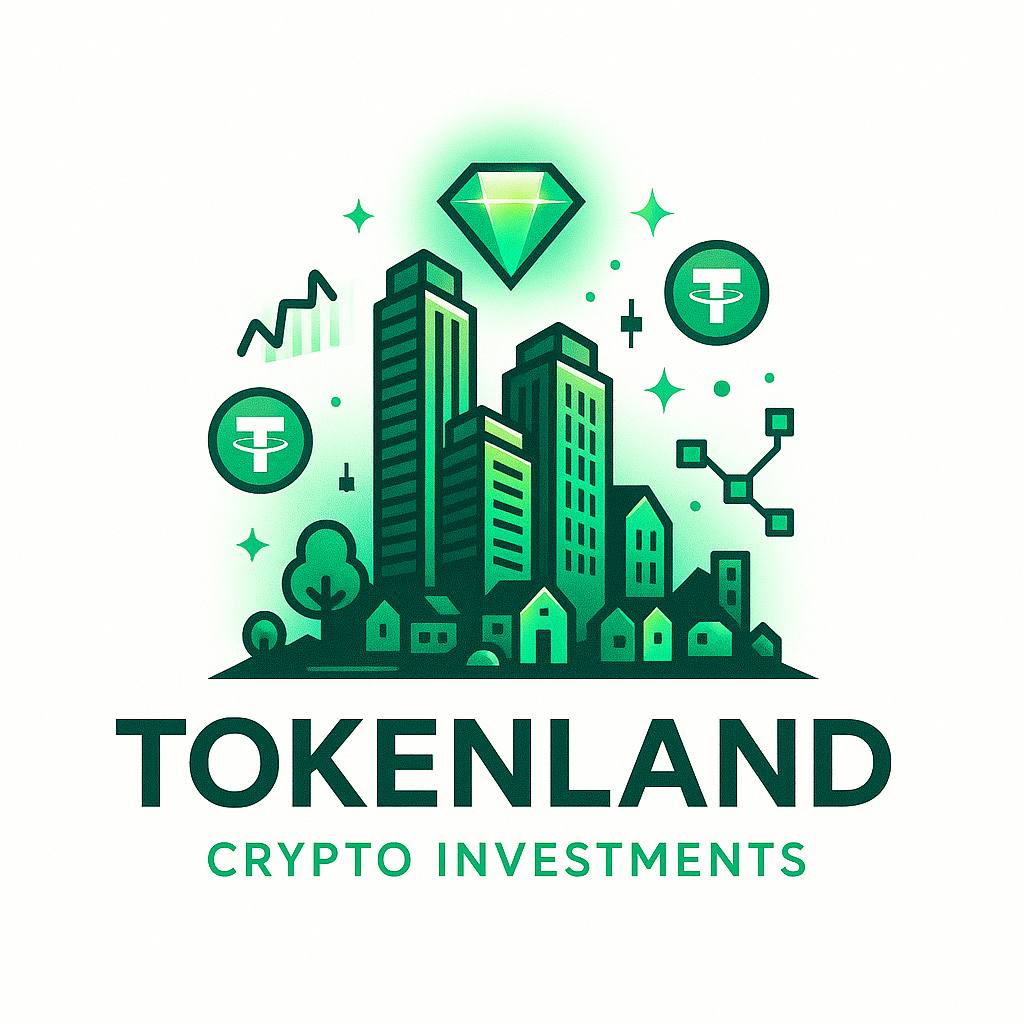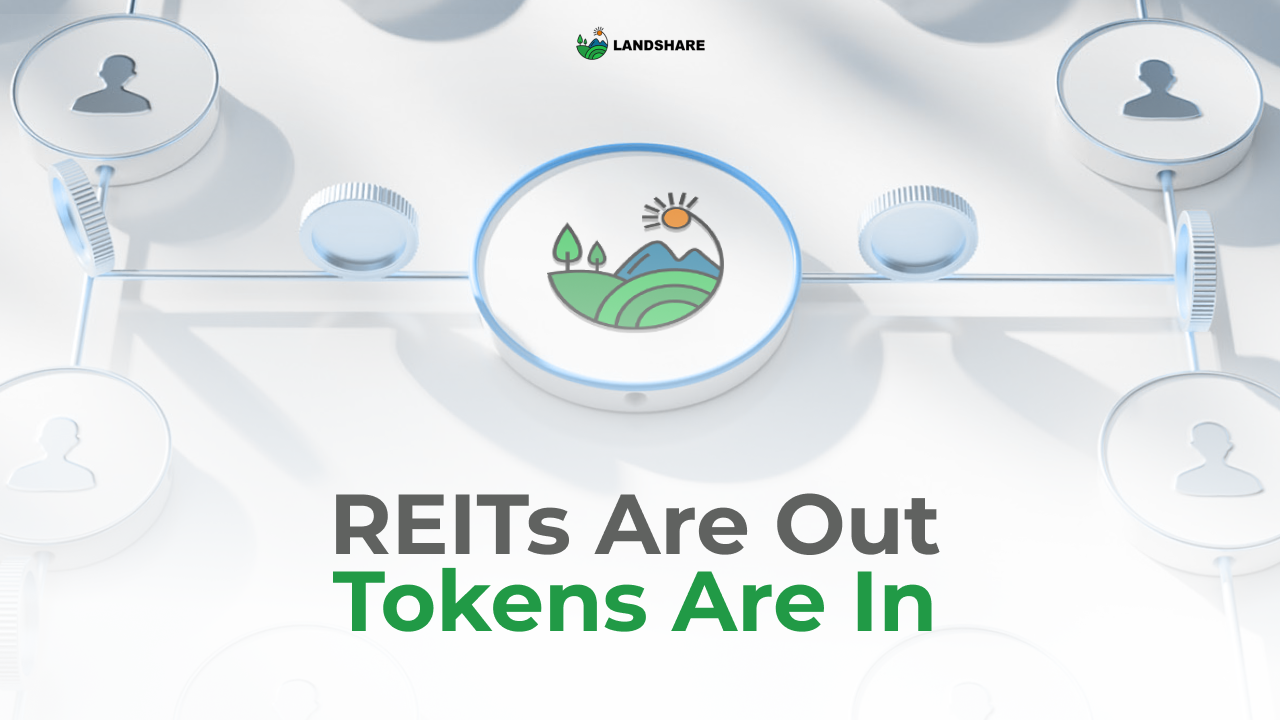Global Investors Will Gain Access to the $337 Trillion Real Estate Market Through U.S. Crypto Projects
TokenLand Team
%20(3).png)
As Bitcoin has dropped more than 12% over the past seven days and Ethereum by 24% over the past month, investors are seeking alternatives in these volatile market conditions. To diversify their portfolios with less volatile assets, global investors are turning their attention to the $337 trillion real estate market.
The real estate market is known for its high entry barriers due to the need for significant capital investment. However, several U.S.-based crypto projects are changing this through real estate tokenization.
One of the projects leading this revolution is TokenLand. So, let's explore what’s driving these changes and why tokenized real-world assets (RWA) are now considered the next big thing in the world of investing.
The real estate tokenization industry is projected to reach $19.4 billion by 2033.
Traditional real estate investments have largely been the domain of the ultra-wealthy and institutional investors. A single property often requires investments of hundreds of thousands of dollars, and cross-border deals come with significant legal complexity.
RWA tokens are changing the game. Through fractional ownership of real estate, blockchain allows investors to buy shares for as little as $1. This shift resembles the evolution of the stock market — from closed trading floors to smartphone apps. However, decentralization plays a key role here.
Moreover, regulatory clarity under existing frameworks and the SEC’s mature stance on security tokens provide a stable foundation. Meanwhile, institutional giants like JPMorgan and BlackRock have begun experimenting with tokenized assets. This also helps build trust in the model among retail investors.
How are U.S.-based crypto projects driving change in the tokenized real-world assets (RWA) space?
While global platforms have made significant strides in tokenization, U.S.-based crypto projects like TokenLand hold unique advantages:
Institutional Trust: U.S. legal structures attract capital focused on risk minimization.
Technological Infrastructure: Powerful DeFi platforms (such as Chainlink, Aave) enable efficient asset management.
Liquidity: Selling real estate in the U.S. can be complex due to legal hurdles. However, trading RWA tokens is relatively simple and offers investors near-instant liquidity.
Why does TokenLand stand out as a leading contender in the tokenized real-world assets (RWA) space?
.png)
Real Utility, Not Just Hype: Investors are actively seeking projects that deliver real value rather than just hype. Thanks to its practical tokenization use case, TokenLand is a strong contender for long-term profitability in the digital economy. Unlike speculative RWA projects, TokenLand’s security tokens represent legal ownership shares in U.S. real estate. Investors also earn passive income from rental payments.
Scarcity and Burning: With 5.34 million tokens (all in circulation) and a burn mechanism triggered with every RWA purchase, LAND is inherently deflationary. In contrast, many competitors have no supply cap or burn mechanisms in place.
Tokenized Real Estate: TokenLand has already sold 4 properties in the U.S. through the BNB Smart Chain, with ownership rights linked to RWA tokens. This demonstrates its focus on real profit from real estate transactions, unlike competitors who primarily rely on hype to drive price growth.
Revenue Model: Rental income and property appreciation are distributed among investors; annual returns exceed 8.7%.
BNB Chain Advantage: Ethereum gas fees make micro-investments impractical. TokenLand’s foundation on BNB Chain enables fractional ownership and caters to retail demand.
Undervalued Entry: With a market cap of $3.11 million, TokenLand offers significant growth potential compared to other overvalued RWA competitors, despite having similar revenue streams.
SAFU Investments: Structured in accordance with U.S. regulatory requirements, TokenLand places strong emphasis on compliance and security.
Moreover, LAND has delivered consistent returns (ROI) through property value appreciation and rental income. This undervalued status highlights an excellent opportunity for investors seeking high-potential projects.
Conclusion
So, the road ahead is clear: tokenization will continue to capture an increasing share of the $337 trillion real estate market. For investors, these advantages offer both balance and profitability:
Diversification: Allocate fractional capital across global markets.
Liquidity: Trade real estate shares 24/7 on secondary markets.
Transparency: Blockchain with an immutable ledger reduces the risk of fraud.
For U.S.-based projects, the challenge lies in scaling while staying compliant with regulations. TokenLand has also addressed this gap. With plans to expand its real estate portfolio, this RWA token enables users to invest in property at low cost and earn high long-term returns.
Токены недвижимости как защита от инфляции? Исследование сценария 2025 года
TokenLand Team
In 2025, inflation continues to challenge the global economy. With rising consumer prices, devalued currencies, and economic uncertainty, investors are searching for dependable assets that protect purchasing power and deliver stable returns.
Traditionally, real estate has been a proven hedge against inflation — offering both price appreciation and passive income. But today, a new, more accessible alternative has emerged: tokenized real estate.
Thanks to platforms like Landshare, investors can now gain exposure to high-quality U.S.-based property assets through blockchain — combining the security of real estate with the power and flexibility of decentralized finance. The result is a next-generation inflation hedge that’s liquid, transparent, and built for yield.
Why Real Estate Works Against Inflation
Historically, real estate performs well during inflationary cycles. As the cost of goods rises, so do property values and rents. This leads to:
- Capital appreciation in physical assets
- Rising rental income that keeps up with inflation
- Consistent cash flow from tenant payments
However, traditional real estate has high entry barriers, low liquidity, and slow transaction processes. Landshare solves all of this with a blockchain-native approach.
Introducing LSRWA: A Tokenized Real Estate Solution for 2025
At the core of Landshare’s ecosystem is LSRWA, a token that represents a share of a pool of real-world, U.S.-based real estate assets. When you hold LSRWA, you're not just speculating — you're actually investing in physical properties that produce income and grow in value over time.
📈 Built-in Appreciation
The value of each LSRWA token grows proportionally with:
- Cash flow generated by rental income
- Underlying property appreciation
This means that simply holding the token over time allows investors to benefit from both rising property values and consistent income streams — two critical components of any inflation hedge.

Triple-Yield DeFi Opportunities with Landshare
What sets Landshare apart isn’t just its real estate exposure — it’s the powerful DeFi integrations that supercharge your returns.
💧 LSRWA-USDT Liquidity Pool (12% APR)
By providing liquidity in the LSRWA-USDT pool, investors can earn an additional 12% APR in staking rewards, on top of their property-backed gains. This creates a blended yield opportunity rarely seen in traditional finance or real estate.
🔁 Borrowing Against LP Tokens
Landshare is rolling out a new borrowing strategy that allows users to:
- Stake their LSRWA-USDT LP tokens
- Borrow $USDC against them
- Continue earning LP rewards and LSRWA appreciation
.png)
This innovative approach creates three income streams at once:
- LSRWA token growth
- LP staking rewards
- Potential gains from utilizing borrowed USDC
It’s a fully optimized, capital-efficient strategy for high-yield real estate exposure — and a major advantage in inflationary conditions.
🎮 Boost Returns with the Landshare NFT Ecosystem
For those seeking an even more engaging experience, Landshare’s NFT Ecosystem adds a unique gamified layer to real estate investing.
LSRWA holders can participate in this NFT-based yield enhancement system, unlocking exclusive boosts and rewards. This ecosystem allows users to:
.png)
- Earn higher yields through NFT upgrades and bonuses
- Engage in strategy-driven gameplay that complements real investing
- Turn real estate into an interactive DeFi experience
Learn more about how it works here.
Real Estate Tokens vs. Traditional Inflation Hedges
Compared to conventional options like gold or T-bills, tokenized real estate offers a compelling advantage:
.png)
Landshare’s model brings together the stability of real estate, the liquidity of crypto, and the rewards of DeFi, making it one of the most attractive options for inflation-resistant investing in 2025.
Final Thoughts: A Smarter Hedge for a New Era
As inflation continues to challenge global financial systems, LSRWA tokens offer a modern, effective way to preserve and grow wealth.
With built-in exposure to real U.S. real estate, passive income through rental yields, and DeFi-powered strategies that unlock multiple layers of returns, Landshare stands at the forefront of the tokenized real estate revolution.
Whether you're looking to safeguard your capital, generate yield, or explore new frontiers in on-chain investing, LSRWA offers a powerful, inflation-hedged solution for 2025 and beyond.
Start earning from real estate — the DeFi way. Learn more at Landshare.io
Global Investors Will Gain Access to the $337 Trillion Real Estate Market Through U.S. Crypto Projects
TokenLand Team
In 2025, the landscape of property investment in the U.S. is being reshaped—not just by shifting market trends, but by a powerful technological revolution: tokenized real estate.
While Real Estate Investment Trusts (REITs) have long served as a gateway for fractional property ownership, a new wave of blockchain property investment platforms is offering something REITs never could—global access, 24/7 liquidity, and full transparency. This is the age of tokenisation, and platforms like Landshare are leading the way.
💡 What Are REITs and Why Have They Been Popular?
REITs have traditionally allowed investors to gain exposure to real estate without directly owning physical property. They're regulated investment vehicles that pool money to purchase or manage income-producing real estate.
Benefits of REITs:
- Steady dividend income
- Exposure to property markets without physical management
- Liquidity (especially with public REITs)
However, REITs come with limitations:
- Lack of transparency
- High management fees
- Restricted market hours
- Limited global access

🔄 REIT vs Tokenisation: Why 2025 Is a Turning Point
Enter tokenized real estate—a model that leverages blockchain technology to digitally represent ownership in real-world properties through tokens. Unlike REITs, where investors buy into a fund, tokenization allows direct, transparent, and programmable ownership in individual assets.
Key Advantages Over REITs:
✅ 24/7 Liquidity – Trade property tokens any time on decentralized exchanges
✅ Fractional Ownership – Invest with as little as $1
✅ Smart Contract Automation – Dividends, ownership transfers, and reporting managed on-chain
✅ Global Participation – Anyone with an internet connection can invest in U.S. real estate
🌍 Globalizing U.S. Property Investment
One of the most significant advantages of tokenized real estate in 2025 is the global democratization of U.S. real estate markets. With regulatory frameworks maturing and platforms like Landshare providing fully-compliant solutions, international investors are able to access U.S. property markets without intermediaries.
This opens the door for:
- Global investors in emerging markets
- Digital nomads and crypto holders
- Institutions seeking stable, asset-backed returns

💼 Landshare: A Leader in Tokenized Real Estate
At the forefront of this transformation is Landshare—a blockchain platform that offers tokenized access to real, income-producing U.S. properties. Unlike traditional REITs, Landshare enables users to stake, trade, and earn passive income through its ecosystem.
What makes Landshare stand out?
- Fully tokenized rental properties
- Integrated staking platform
- Real-time asset transparency
- DeFi integration for additional yield opportunities
Landshare empowers users to move beyond REITs and into a more flexible, modern, and profitable model of real estate investing.

📈 Future Outlook: The Rise of Blockchain Property Investment
As the real estate industry embraces blockchain technology, tokenized real estate is poised to become a cornerstone of any forward-thinking investment portfolio.
With the benefits of liquidity, transparency, and accessibility, it's clear that tokenized property investment is not just an alternative to REITs—but an upgrade.
By 2025, as more investors demand control, speed, and lower costs, tokenisation will become the standard—not the exception.
🏁 Заключение
The shift from traditional REITs to tokenized real estate marks a pivotal moment in property investment. Platforms like Landshare are making it possible to invest in U.S. real estate smarter, faster, and globally.
Whether you're a seasoned investor or just entering the Web3 space, it's time to ask:
Why settle for outdated REITs when tokenization offers so much more?
Landshare's Loan Protocol: Access Liquidity Without Selling Your Tokens
TokenLand Team
At Landshare, we aim to make real estate investment accessible to everyone. By tokenizing real estate assets, we allow users to invest in prime properties worldwide without the massive upfront cost.
We’ve brought out our latest update: the Loan Protocol. Through this, token holders can access liquidity without selling their assets by using Landshare Tokens (LAND) or Real World Asset Tokens (LSRWA) as collateral.
This creates a mutually beneficial scenario for both borrowers and lenders. Borrowers gain the cash flow they need, while lenders earn consistent returns through interest. How does this work? Let’s discuss
The Promise of Loan Protocol
If you’re holding LAND or LSRWA tokens, why let them sit idle when you can borrow USDC and put your assets to work?
With the Landshare Loan Protocol, you don’t need to sell your valuable tokens to access liquidity. Instead, you can use them as collateral and get the funds you need while retaining ownership of your assets. Whether you want to cover personal expenses, make new investments, or take advantage of other opportunities by borrowing USDC through Landshare, you can maximize tokens' potential without parting with them.
As a lender, the protocol helps you earn 10% APY by contributing USDC.
How does it work?
The Landshare Loan Protocol has two distinct pools: one for LSRWA tokens and another for LAND tokens. Each of these pools has a set maturity date, the deadline by which loans must be repaid. If the loan isn’t repaid by this date, the collateral used by the borrower will be liquidated, meaning it will be sold to recover the loan amount.

The completion percentage displayed for each pool shows how much time has passed in the loan term. For example, if the completion percentage is 50%, half the term is completed, and the same amount of time remains before the maturity date.
Once the loan term ends and the maturity date is reached, lenders will get their USDC back along with the interest earned during the loan period. This interest comes from the borrower’s repayment and is set at 10% APY. This means borrowers pay 10% in interest, and lenders earn 10% on their funds. As a lender, your USDC is secured by the collateral the borrower has provided—either LAND or LSRWA tokens. This makes the system secure for lenders since their funds are protected.
The protocol uses over-collateralization to reduce the risk for lenders. This means that borrowers must provide more collateral than the value of the loan they’re taking.
For example, in the LSRWA pool, a borrower can only withdraw up to 50% of the value of their collateral. So if someone deposits $100 worth of LSRWA, they can only borrow 50 USDC. This extra collateral helps to protect lenders because the loan is backed by more than the borrowed amount, lowering the chances of a loss in case the borrower defaults.
If a loan is not repaid by the maturity date, the collateral (either LSRWA or LAND) will be sold to pay back the loan amount, including any interest. A 10% liquidation fee is also levied.
After the liquidation, if there is any remaining balance from the sale of the collateral, the borrower can claim it. This process ensures that lenders are compensated even if a borrower fails to repay the loan.
How to borrow USDC using LSRWA and LAND
The process of borrowing USDC by pawning your LSRWA and LAND tokens is straightforward. Let’s walk through it:

- As discussed, there are two pools for each of the tokens: LSRWA and LAND. Press the Borrow button of the pool against which you want to borrow USDC.

- Next, a pop-up will appear on your screen. Enter the amount of USDC you wish to borrow. Once you do that, the collateral amount will be displayed immediately.

- Now, simply press the Borrow button and approve the transaction in your wallet. You will be able to see the borrowed USDC in your wallet.
How to lend USDC using LSRWA and LAND
You can lend your stablecoins through this protocol and earn 10% APY. The process is simple. Let’s look at it:

- This time, press the Supply button.

- Next, a pop-up will appear on the screen. Enter the amount you can supply and hit the " Supply" button.
Enhanced Capital Efficiency with $LSRWA
We’re rolling out a new borrowing strategy that unlocks triple the earning potential for our users. You’ll be able to borrow against staked LSRWA-USDT LP Tokens, allowing you to stack rewards from three sources at once:
- LSRWA appreciation
- LSRWA-USDT LP staking rewards
- Gains from borrowed USDC
But wait, there’s more! 👀
If you buy $LSRWA via the DS Dashboard, you’ll earn NFT Credits. These credits can be used to mint NFTs and unlock even more rewards, taking your real estate investing to the next level with a touch of DeFi magic!
How the new borrowing strategy will work:
1. Create LP Tokens: Pair USDT and LSRWA on DS Swap to generate LSRWA-USDT LP Tokens.
2. Wrap and Stake: Deposit LP Tokens into a wrapped contract to keep earning LAND yields.
3. Borrow USDC: Use your wrapped LP Tokens as collateral and unlock USDC via our Loan Protocol.
💡 Why is this exciting? This strategy supercharges your capital efficiency, letting you grow your portfolio without missing out on staking rewards or token gains.
Final Note
Borrowing through the Landshare Loan Protocol offers more than just quick access to cash—it’s an opportunity to make your tokenized assets work for you. You don’t have to choose between selling your tokens and staying liquid.
With a fixed maturity date and competitive interest rates, this system allows you to borrow responsibly while keeping your tokens safe.
Take advantage of the liquidity your assets can provide through the Landshare Loan Protocol.




.png)

